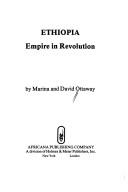| Listing 1 - 10 of 11 | << page >> |
Sort by
|

ISBN: 0812920147 Year: 1993 Publisher: New York Times Books
Abstract | Keywords | Export | Availability | Bookmark
 Loading...
Loading...Choose an application
- Reference Manager
- EndNote
- RefWorks (Direct export to RefWorks)
Book
ISBN: 9781626376311 162637631X 9781626376205 1626376204 Year: 2017 Publisher: Boulder
Abstract | Keywords | Export | Availability | Bookmark
 Loading...
Loading...Choose an application
- Reference Manager
- EndNote
- RefWorks (Direct export to RefWorks)
Book
ISBN: 0190099569 0197507107 9780190099565 9780197507117 0197507115 9780197507100 Year: 2019 Publisher: London : Hurst & Company,
Abstract | Keywords | Export | Availability | Bookmark
 Loading...
Loading...Choose an application
- Reference Manager
- EndNote
- RefWorks (Direct export to RefWorks)
Marina and David Ottaway have brought together fifty years of experience observing the Arab world, and a wealth of first-hand information gathered from living and travelling extensively in the region. 'A Tale of Four Worlds' is an indispensable analysis of the profound upheavals that have shaken - and continue to transform - Arab and global politics.
Arab Spring, 2010 --- -Arab countries --- Politics and government --- -Arab Awakening, 2010 --- Arab world --- Arabic countries --- Arabic-speaking states --- Islamic countries --- Middle East --- -Arab Spring (2010-) --- 2000-2099 --- Arab countries --- -World politics --- Arab Spring (2010-) --- Arab Awakening, 2010
Book
ISBN: 9780190061715 Year: 2019 Publisher: Oxford, UK : Oxford University Press,
Abstract | Keywords | Export | Availability | Bookmark
 Loading...
Loading...Choose an application
- Reference Manager
- EndNote
- RefWorks (Direct export to RefWorks)
First came the disintegration of the Ottoman Empire following World War I; then, in the 1950s and '60s, the Nasser-inspired wave of Arab nationalism and socialism. The Arab world's third great political cataclysm of the past 100 years has also brought permanent changes, but not as its activists had hoped : the 2011 uprisings. Their consequences have differed greatly from area to area, splintering the Arab region into four different worlds, The Levant states have disintegrated, possibly irreversibly. The Gulf monarchies have embarked on far-reaching plans of economic and social change to stave off discontent. Egypt has retreated into military authoritarianism and a war on Islamists, threatening its future stability. Only the Maghreb countries, which have started integrating Islamists into their political systems, offer some hope for progress toward democracy. This book is an indispensable analysis of the profound upheavals that have shaken - and continue to transform - Arab and global politics.
Book
ISBN: 162637631X 1626376204 Year: 2022 Publisher: Boulder : Lynne Rienner Publishers,
Abstract | Keywords | Export | Availability | Bookmark
 Loading...
Loading...Choose an application
- Reference Manager
- EndNote
- RefWorks (Direct export to RefWorks)
After the autocratic regimes in the seemingly unassailable police states of Tunisia and Egypt suddenly collapsed in 2011, the Islamic parties that took over quickly succumbed in turn to further massive uprisings, this time by disaffected secularists and, in the case of Egypt, with the support of the army. What explains this? And why do the current regimes in both countries remain so fragile? Addressing these questions, drawing on years of first-hand, in-depth research, David Ottaway explores the causes of the revolutions in Tunisia and Egypt, the reasons for their radically differing outcomes, and the likely trajectory of the two countries’ political development.
POLITICAL SCIENCE / World / Middle Eastern. --- Egypt --- Tunisia --- Politics and government --- Chunijia --- Chunijia Kyōwakoku --- Jumhuriya at-Tunisiya --- Jumhūrīyah al-Tūnisīyah --- Republic of Tunisia --- République tunisienne --- Tunesien --- Túnez --- Tunis (Protectorate) --- Tunisie --- Tunisskai︠a︡ Respublika --- Tunisyah --- チュニジア --- チュニジア共和国 --- Égypte --- Ägypten --- Egitto --- Egipet --- Egiptos --- Miṣr --- Southern Region (United Arab Republic) --- Egyptian Region (United Arab Republic) --- Iqlīm al-Janūbī (United Arab Republic) --- Egyptian Territory (United Arab Republic) --- Egipat --- Arab Republic of Egypt --- A.R.E. --- ARE (Arab Republic of Egypt) --- Jumhūrīyat Miṣr al-ʻArabīyah --- Mitsrayim --- Egipt --- Ijiptʻŭ --- Misri --- Ancient Egypt --- Gouvernement royal égyptien --- جمهورية مصر العربية --- مِصر --- مَصر --- Maṣr --- Khēmi --- エジプト --- Ejiputo --- Egypti --- Egypten --- מצרים --- United Arab Republic

ISBN: 0841903638 084190362X 9780841903630 Year: 1978 Publisher: New York : Africana Pub. Co.,
Abstract | Keywords | Export | Availability | Bookmark
 Loading...
Loading...Choose an application
- Reference Manager
- EndNote
- RefWorks (Direct export to RefWorks)
Book
Year: 1970 Publisher: Berkeley (Calif.) : University of California press,
Abstract | Keywords | Export | Availability | Bookmark
 Loading...
Loading...Choose an application
- Reference Manager
- EndNote
- RefWorks (Direct export to RefWorks)
Book
Year: 1970 Publisher: Berkeley-Los Angeles University of California Press
Abstract | Keywords | Export | Availability | Bookmark
 Loading...
Loading...Choose an application
- Reference Manager
- EndNote
- RefWorks (Direct export to RefWorks)
Book
ISBN: 9781685851057 Year: 2022 Publisher: Boulder
Abstract | Keywords | Export | Availability | Bookmark
 Loading...
Loading...Choose an application
- Reference Manager
- EndNote
- RefWorks (Direct export to RefWorks)
Digital
ISBN: 9781626376311 Year: 2022 Publisher: Boulder Lynne Rienner Publishers
Abstract | Keywords | Export | Availability | Bookmark
 Loading...
Loading...Choose an application
- Reference Manager
- EndNote
- RefWorks (Direct export to RefWorks)
| Listing 1 - 10 of 11 | << page >> |
Sort by
|

 Search
Search Feedback
Feedback About UniCat
About UniCat  Help
Help News
News